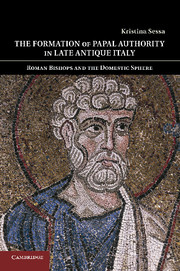Book contents
- Frontmatter
- Contents
- Acknowledgments
- Abbreviations
- Map Late Roman Italy
- Roman Bishops from Peter to Gregory I
- Introduction: Household Management and the Bishop of Rome
- Chapter 1 The Late Roman Household in Italy
- Chapter 2 From Dominion to Dispensatio: Stewardship as an Elite Ideal
- Chapter 3 Primus Cultor: Episcopal Householding in Theory and Practice
- Chapter 4 Overseeing the Overseer: Bishops and Lay Households
- Chapter 5 Cultivating the Clerical Household: Marriage, Property, and Inheritance
- Chapter 6 Mistrusting The Bishop: Succession, Stewardship, and Sex in the Laurentian Schism
- Chapter 7 The Household and The Bishop: Authority, Cooperation, and Competition in the Gesta Martyrum
- Conclusion
- Bibliography
- Index
- References
Chapter 4 - Overseeing the Overseer: Bishops and Lay Households
Published online by Cambridge University Press: 05 December 2011
- Frontmatter
- Contents
- Acknowledgments
- Abbreviations
- Map Late Roman Italy
- Roman Bishops from Peter to Gregory I
- Introduction: Household Management and the Bishop of Rome
- Chapter 1 The Late Roman Household in Italy
- Chapter 2 From Dominion to Dispensatio: Stewardship as an Elite Ideal
- Chapter 3 Primus Cultor: Episcopal Householding in Theory and Practice
- Chapter 4 Overseeing the Overseer: Bishops and Lay Households
- Chapter 5 Cultivating the Clerical Household: Marriage, Property, and Inheritance
- Chapter 6 Mistrusting The Bishop: Succession, Stewardship, and Sex in the Laurentian Schism
- Chapter 7 The Household and The Bishop: Authority, Cooperation, and Competition in the Gesta Martyrum
- Conclusion
- Bibliography
- Index
- References
Summary
Roman bishops faced an impasse when they tried to exercise influence over the lay household. They and other authorities encouraged traditional domini to take a leading role in the religious life of their homes. For centuries, ancient householders had recognized their responsibility to ensure that the gods were properly cultivated and worshipped in perpetuity, duties that they solemnly fulfilled even if they did not personally execute every rite. Christianity did little to alter this dynamic, although it did foreground the centrality of religious observance for oikonomia in an unprecedented fashion. The inscription on the bronze boat-shaped lamp created for Valerius Severus illustrates this new emphasis. The epigraph proclaimed that Valerius received “the law” from God and with it the obligation to oversee its proper observance in his home. Rather than situate Severus’ duties within an ecclesiastical framework, however, the lamp mentions no church officials. Severus’ name appears with figurines of Peter and Paul, founding fathers of the Roman church to be sure, but hardly “papal” signatures, as some have concluded. In fact, Severus’ lamp underlines the challenges that Roman bishops faced when they tried to establish their presence within traditional elite homes. If householders were the original experts and divinely appointed stewards of the domestic sphere, then what role remained for bishops to play in the governing of a lay Christian domus? On what grounds might they claim authority to oversee the overseer?
This chapter examines the efforts of Roman bishops to develop expertise in certain areas of domestic life. It explores how they involved themselves in the resolution of highly ambiguous legal and ethical matters in the lay home. To be clear, Rome's bishops did not replace the dominus as the primary “decider” of difficult household questions. Lay householders remained powerful ethical authorities as well as crucial overseers of religious activities in their homes. Bishops, however, could offer the family something that lay patresfamilias could not: a reputation for spiritual discernment and a perceived familiarity with both religious ethics and civil law. As Kevin Uhalde has shown, late Roman bishops endeavored to be seen as “exceptional judges,” who were especially adept at discerning certain spiritual and secular obscurities. We suggest that Roman prelates wanted to appear not as exceptional judges but as exceptional domestic counselors or “troubleshooters,” who offered advice on seemingly intractable problems involving the intersection of civil law, Christian ethics, and the domestic sphere. In this respect, bishops might play a domestic role that largely complemented the lay paterfamilias’ traditional obligations to order and discipline his domus.
- Type
- Chapter
- Information
- The Formation of Papal Authority in Late Antique ItalyRoman Bishops and the Domestic Sphere, pp. 127 - 173Publisher: Cambridge University PressPrint publication year: 2011



